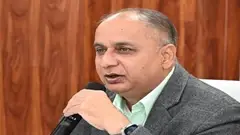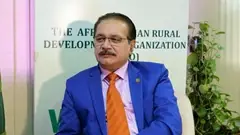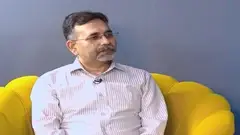
Background
Zinc has emerged as the most widespread micronutrient deficiency in soils and crops worldwide, resulting in severe yield losses and deterioration in nutritional quality, adversely impacting human health. Almost half of the soils in the world are deficient in zinc and India is not an exception to that. India is a zinc deficient country and about 37 per cent soil samples analyzed for available zinc have been found deficient that subsequently leads to zinc deficiency in humans resulting in micronutrient malnutrition.
This has drawn the attention of the government and policy makers in India who have realized the need to create awareness on the critical role of zinc in fertilizers. In this vein, International Zinc Association has been working extensively with the central and state governments, academic institutions, industry bodies and International organisations, like the World Bank to help spread awareness on deficiency of Zinc in the agricultural sector (especially fertilizers). From recommending reforms in GST on Zinc Fertilizers to amendments in Zincated Urea Policy to educating farmers on the quality issues of Zinc Fertilizers available in Indian markets.
Krishi Jagran got the privilege to talk to Dr. Soumitra Das – Director, South Asia (Zinc Nutrient Initiative) International Zinc Association. Here are the excerpts from the interview.
Is there a need for correcting GST rates for Zinc Fertilizers to up the intake by farmers? If yes, why?
Absolutely. GST, the historic tax reform in India, was implemented on 1st July 2017 by the Govt of India. Just before the final announcement, the GST rates on bulk fertilizers were reduced from 12% to 5% and micronutrients were left out in the process. GST on micronutrients, including zinc fertilizers is 12%, whereas micronutrient mixture is 18%. The GST rates on micronutrients should be kept at par with the bulk fertilizers at 5%. In fact, all the fertilizers products mentioned in the FCO should be treated at par to encourage the use of Zinc and other micronutrients in the balanced fertilizer use by the farmers that will further enhance the agricultural productivity.
What is your input on focussing over reforms in Fertilizer Policy to decontrol urea and measures to ease the Zincated Urea pricing?
The Nutrient Based Subsidy (NBS) Scheme was launched in 2010, in which urea was not included and is still out of the ambit of the scheme. As a result, farmers are buying urea in bulk – much more than the actual requirement given its price – distorting the NPK ratio and discouraging the balanced fertilizer use.
Zincated Urea was approved and included in FCO in 1990s. However, its production could not be commenced by the industry as the MRP of Zincated Urea fixed by the government is low and does not cover Zn fortification cost. Under the NBS Scheme, the government has provided additional subsidy of INR 500 per tonne of Zn fortification, however, this is also not adequate enough to meet the cost of Zn and its fortification. The Zincated-Urea policy needs to be re-looked and prioritised, seeing to the widespread Zn deficiency in soils, crops and humans, leading to malnutrition.
Your views on introduction of new and innovative fertilizers in the Fertiliser Control Order (FCO), like ZnO, Urea fortified with Zn & B and Zn-B products, etc.
ZnO is not included as a fertilizer in FCO. Though, its liquid form, ZnO suspension concentrate with 39.5% Zn is approved in FCO. In addition, ZnO solution is also recommended by the State Governments for root dipping and seed coating before crop transplant. ZnO is also a preferred raw material for fortification of bulk fertilizers. Moreover, due to lack of availability of quality Zn ash, the production of Zn-fertilizers is getting impacted. The inclusion of ZnO dry powder in FCO as fertilizer, preferably for the acidic soils, would serve as a viable option for the farmers to choose from the product basket.
In order to address the widespread micronutrient deficiency in Indian soils, mainly Zn and B, Zn-B fortified urea as well as Zn-B product in powder / granulated form have been advocated. It will ensure the application of these micronutrients, wherever the farmers are not applying straight micronutrient fertilizers.
How can one scale up the awareness and sensitise the stakeholders on the quality of Zinc Fertilizers vs sub-standard / spurious materials available in the market.
Quality of Zinc fertilizers available in the market is sometimes a matter of concern. There are reports of sub-standard / spurious materials from different states. The best way to address this issue is by increasing the awareness and educating the concerned stakeholders, including the extension & promotional workers and more importantly, the last mile delivery - the end beneficiary, the farmers. This could be scaled up by imparting training of the trainers in various sectors, including State Government, Fertilizer Industry, NGOs etc., so that they may in turn make the farmers aware through farmers meetings, farmer’s trainings, Zinc Days, Farm exhibitions, Kisan melas, etc. By and large, farmers awareness on quality fertilizers would weed out sub-standard or spurious materials from the markets.
Awareness on IZA’s current programs, how do they measure success, and who are the targets segments for such programs serve
The Zinc Nutrient Initiative is an international flagship initiative of the International Zinc Association which addresses zinc deficiency in soils, crops and humans through increased use of zinc fertilisers. The various approaches undertaken are coordinating crop demonstration trials; organising international, national and regional conferences, workshops and seminars; conducting training programmes and publications.
There are a number of global initiatives of IZA. It has partnered with the World Bank on Zinc Fertilizer Trials on farmers’ fields with the help of RACP, Govt of Rajasthan. IZA has also collaborated with BARI, Government of Bangladesh on Zinc Fertilizer Project in Bangladesh. Zinc Saves Kids is another global initiative in support of UNICEF of the United Nations.
Overall, the success is measured through the increase in consumption of Zinc fertilizers for food and nutritional security in the country with the key objective to serve the concerned stakeholders, specially the end beneficiary - the farmers.















Share your comments